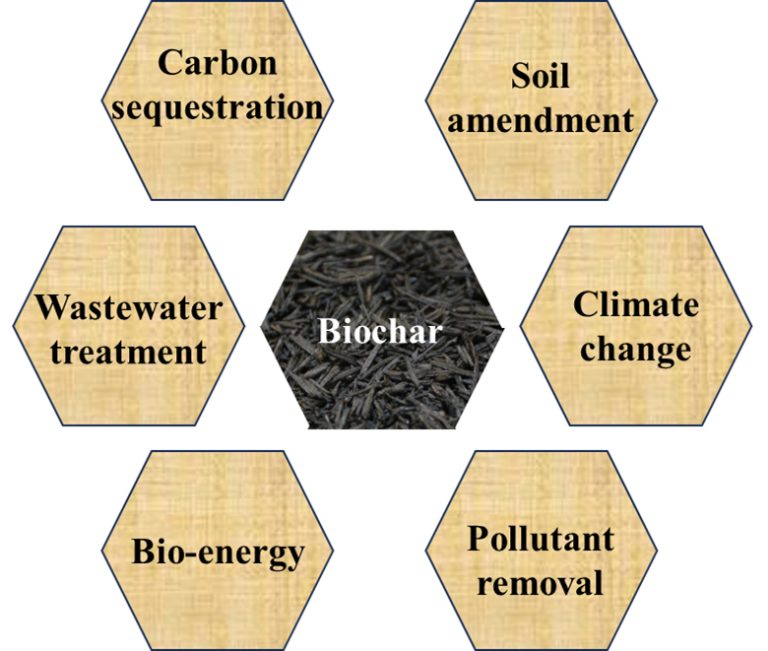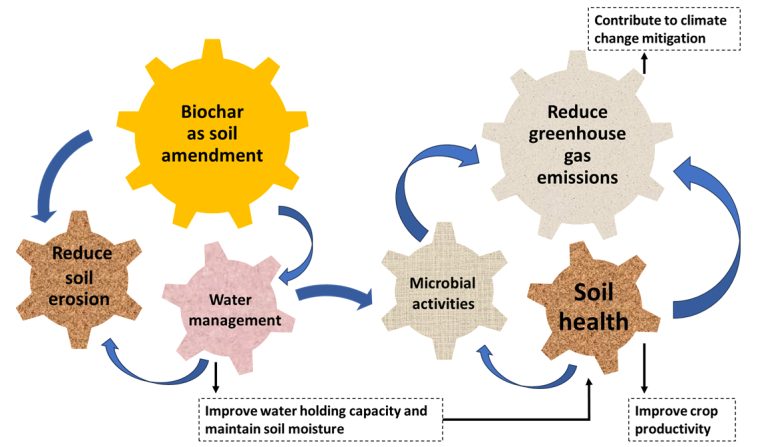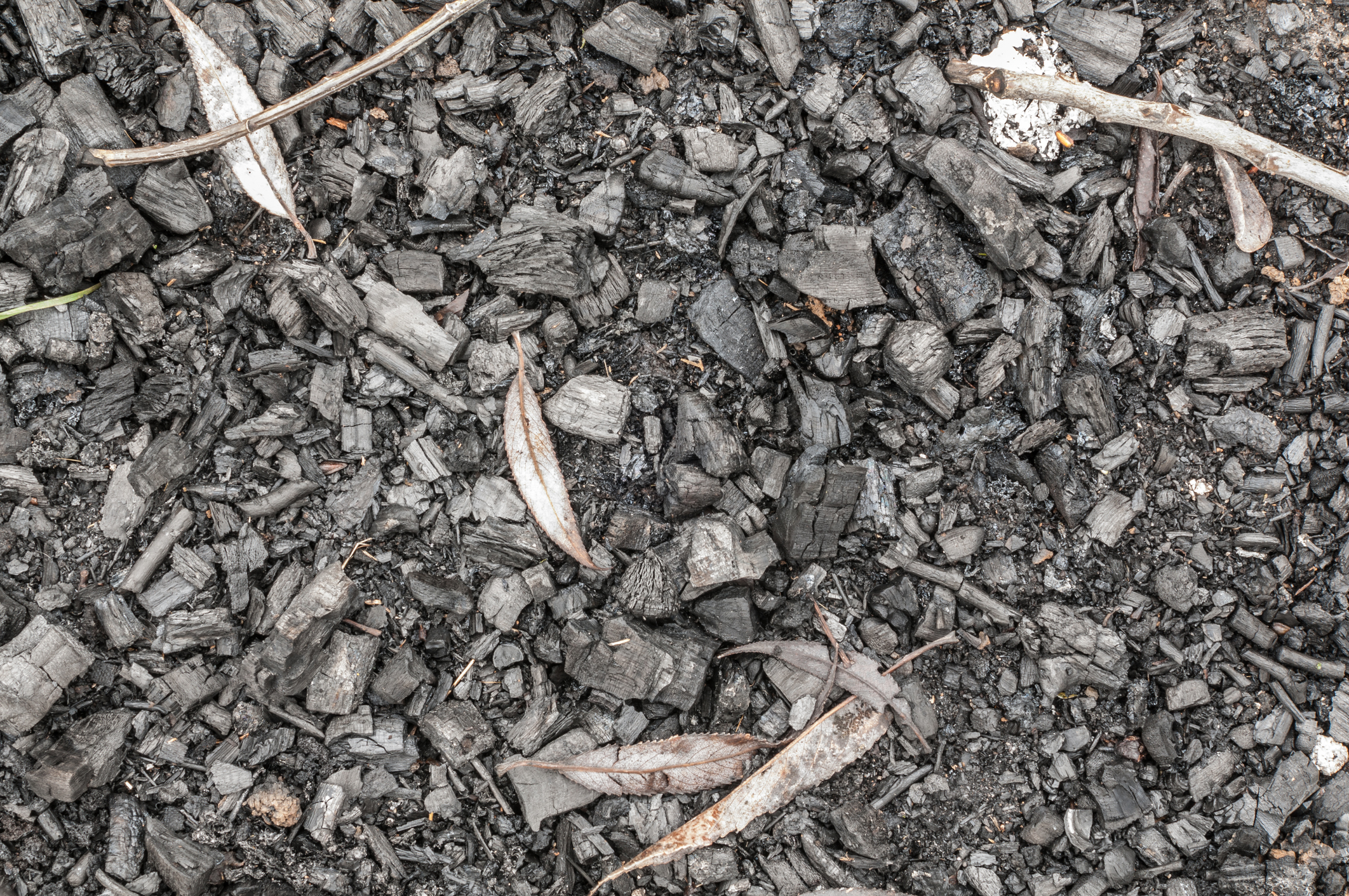Biochar, also referred to as carbon material, is produced from the thermochemical conversion process (heating or burning) of feedstocks or waste biomass, such as forest residue, crops, or agricultural waste, in the absence of oxygen (or in limited oxygen-supply environments).
Biochar has widespread applications for bioenergy production, carbon capture and storage, contaminated soil remediation, soil amendment, nonpoint source pollution management, wastewater treatment, and water quality improvement. Biochar offers promising solutions for sustainable agriculture by enhancing soil quality, conserving resources, reducing negative environmental impacts, and contributing to climate change mitigation. In recent decades, there has been a resurgence of interest in biochar due to growing concerns about soil degradation and climate change. Biochar is a vital tool in the search for more sustainable and resilient food production systems because the agricultural industry faces increasing challenges.
Production of Biochar

Thermo-chemical conversion of biomass via pyrolysis, gasification, or hydrochemical carbonization produces carbonaceous material, biochar. Generally, biochar is produced from agricultural waste biomass or forest residue, typically using pyrolysis, at a temperature of 400 to 900 degrees C (or 752 to 1652 degrees F) in an oxygen-limited environment, efficiently removing impurities and volatile compounds. Biochar produced from biomass has high stability in the environment compared to biomass, which decomposes quickly. Characteristics and inherent unique properties (carbon and nutrient contents) depend on the burning temperature and biomass or feedstock types.
Application of Biochar
Interest in biochar experienced a resurgence in the early twenty-first century, driven by concerns about soil degradation, climate change, and agricultural sustainability. Biochar is added to soils to enhance water retention, plant nutrient availability, microbial activity, and crop yields and mitigate the negative effects of climate change via soil carbon sequestration. Further, when incorporated into soils, biochar can store carbon for hundreds to thousands of years, helping reduce greenhouse gas emissions and combat climate change. Biochar can be applied to agricultural fields via various methods, such as broadcasting, seed coating, mulching, compositing, fertilizer blending, and mixing with a water supply. Biochar, as an agro-forest product, has also gained interest from producers in the market.
Why Biochar Is Vital for Improving Soil Health?

Biochar can be incorporated into the soil to enhance its physical, chemical, and biological properties, improving soil structure and fertility. It improves soil structure by increasing cation exchange capacity, water-holding capacity, aeration, and nutrient retention. Biochar is also a stable carbon source, promoting soil microbial activity and nutrient cycling, thus enhancing overall soil quality, making it more suitable for plant growth, and contributing to increased crop yields. Amending soils with biochar is especially beneficial in regions with acidic soils, degraded soils with low fertility, or areas where crops are susceptible to heat, drought, and nutrient deficiencies.
Improved Water Management
Amending soil with biochar improves the water-holding capacity of the soil, reduces the risk of drought stress and waterlogging due to biochar’s porous structure having better water retention properties, reduces the need for irrigation, and helps plants withstand drought conditions better.
Effective Nutrient Retention
Biochar has high surface area and cation exchange capacity, allowing it to bind and retain nutrients in the soil and increasing the availability of essential elements to plants, reducing the need for synthetic fertilizers.
Reduced Greenhouse Gas Emissions
Biochar helps soil carbon sequestration by preventing atmospheric carbon dioxide (CO2) release. Biochar as a soil amendment alters soil properties and microbial activities as microbes reduce methane (CH4) production and release of other major greenhouse gases—methane and nitrous oxide (N2O) emissions from agricultural soils.
Carbon Sequestration
Biochar is a stable form of carbon that resists decomposition. As incorporated into soil, it sequesters carbon for extended periods, contributing to efforts to mitigate climate change. Increased soil carbon content can also enhance soil microbial activity and organic matter content.
pH Buffering
Biochar can help stabilize soil pH levels. It tends to be slightly alkaline, which can counteract soil acidity. In acidic soils, biochar can raise the pH, making it more suitable for a broader range of plants and beneficial microorganisms.
Microbial Activity
Biochar provides habitat for soil microbes. These microbes contribute to improved nutrient cycling, organic matter decomposition, and disease suppression, ultimately promoting healthier plant growth.
Limitations and Considerations for Biochar Use in Agricultural Systems
- Biochar binds nutrients onto their surface and, thus, may prevent soil nutrient supply and crop productivity.
- Excessive application of biochar can induce nutrient adsorption-desorption simultaneously in the soil, which impacts soil microbial activities and crop growth.
- Soil pH increases may cause a reduction in the availability of micronutrients in the soil to plants.
- Biochar alters the physiochemical properties of soil, which could negatively disrupt the growth conditions of microorganisms in the soil.
- Biochar can alter the soil microbial community and contribute to greenhouse gas emissions.
- The high cost of biochar production and transportation and the optimal method of application are additional challenges.
- The impacts of biochar on soil health and product yields depend on many factors, such as soil and biochar types, climate conditions, so large field-scale studies are needed before wide-scale adoption of biochar.
Rakesh Kumar, Postdoctoral Fellow, Biosystems Engineering, Auburn University; Jasmeet Lamba, Associate Professor, Biosystems Engineering, Auburn University; Sushil Adhikari, Professor, Biosystems Engineering, Auburn University; Allen Torbert, Research Leader, USDA-ARS National Soil Dynamics Laboratory; and Wendiam Sawadgo, Extension Economist, Assistant Professor, Agricultural Economics and Rural Sociology, Auburn University
New March 2024, Application of Biochar in Agricultural Systems, ANR-3058
Funding for this work was provided by the United States Department of Agriculture (USDA)-Agricultural Research Services under a nonassistance cooperative agreement (58-6010-2-005), USDA-NIFA Hatch Project (ALA014–1-19052), and the Alabama Agricultural Experiment Station. Partial support was also provided by the National Science Foundation (award # 2316278).




